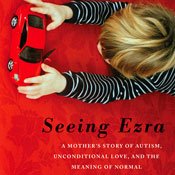For me, the pivotal scene in Kerry Cohen's "Seeing Ezra: A Mother's Story of Autism, Unconditional Love, and the Meaning of Normal" (Seal Press, 2011, $25) is her session with Shannon, a professional Tarot card reader. Cohen asks Shannon whether she and her husband will stay together, and—most urgently—whether her 4-year-old son Ezra, who is autistic and has by this point only recently begun speaking in sentences, is going to be OK.
The psychic's answers to both questions are positive but not cloying, exactly the sort of words that Cohen needs to hear at the time. She leaves the session feeling validated.
Cohen, who by this point in the book does not strike me as somebody who especially believes in psychic phenomena, seems like an unlikely sort of client. Tarot does not come up again, and it's clear that she does not put any special stock in it.
But what she has been told about Ezra has brought her to a point where, in a spirit of prayerful desperation, it makes sense to consult a Tarot reader. She has, after all, already consulted numerous doctors, psychologists, occupational and speech therapists, fringe nutritionists, and other purported and unpurported experts in hopes of hearing something helpful.
Most of what she hears is that she's an unworthy, dysfunctional mother and Ezra an unworthy, dysfunctional child. They have both been judged, and found guilty, by the casual judgments of busy and emotionally unengaged authority figures. The psychic, at least, acknowledges her humanity.
Not long afterward, Cohen pulls Ezra out of school based on a strong gut instinct: "He walks along the edge of the sandbox, wearing his backpack. Ezra can't put on his own backpack. He's never done so in his life. None of the other children wears their backpack. Can you see this? Can you picture what I saw that day? They put his backpack on him, as if he were a coat rack, a thing, so it wouldn't be forgotten. ... I take him by the hand, I put him in the car and we never, ever go back."
This is a heroic moment—rare in a book where Cohen seems to work hard to make sure not to play up her own heroism. Her descriptions of a near-affair with Frank, an old flame (who also happens to be married), reach Hitchcock-level suspense. Nothing especially happens in these scenes, but what almost happens, time after time, shows how close Cohen comes to making a decision that would have been disastrous for her and her family. These tense moments, interspersed with scenes that describe her husband Michael as depressed and overwhelmed but otherwise near saintly, are uncomfortable to read.
You might get the sense from my review that "Seeing Ezra" isn't really just about Ezra, and you'd be right, but the way his life illuminates his mother's, and the way her life illuminates his, tells us things that we would not have been able to learn in a saccharine, pseudo-inspirational account of an unfailingly heroic mother and her struggling child.
Ezra knows who he is and, as Cohen often reminds us, his autism means that he often needs less from other people, not more. He is happy, driven and focused. And Cohen, for her part, makes it clear that she is entirely capable of addressing her own needs—and is at times baffled by people who won't take responsibility for their own emotional lives, a problem that Ezra does not have to deal with.
"Seeing Ezra" is also a critique of how we judge people and why. Cohen is scientifically literate enough to know as well as anyone can what the autism spectrum is, but pragmatic enough to realize that credentials are no substitute for unconditional love ("I'm pretty sure this is the only rule for parenting," she writes). Nothing in the book makes her angrier, or angry more often, than other people's presumption that Ezra's position on the autism spectrum gives strangers the authority to demonstrate their own incompetence by pitying him or otherwise attempting to dictate how he should spend his life. Her strength, and his, is educational and contagious.
Freelance writer Tom Head is a lifelong Jacksonian. He has authored or co-authored 24 nonfiction books on a wide range of topics, is a civil liberties writer for About.com, and volunteers as a grassroots progressive activist.



Comments
Use the comment form below to begin a discussion about this content.
comments powered by Disqus